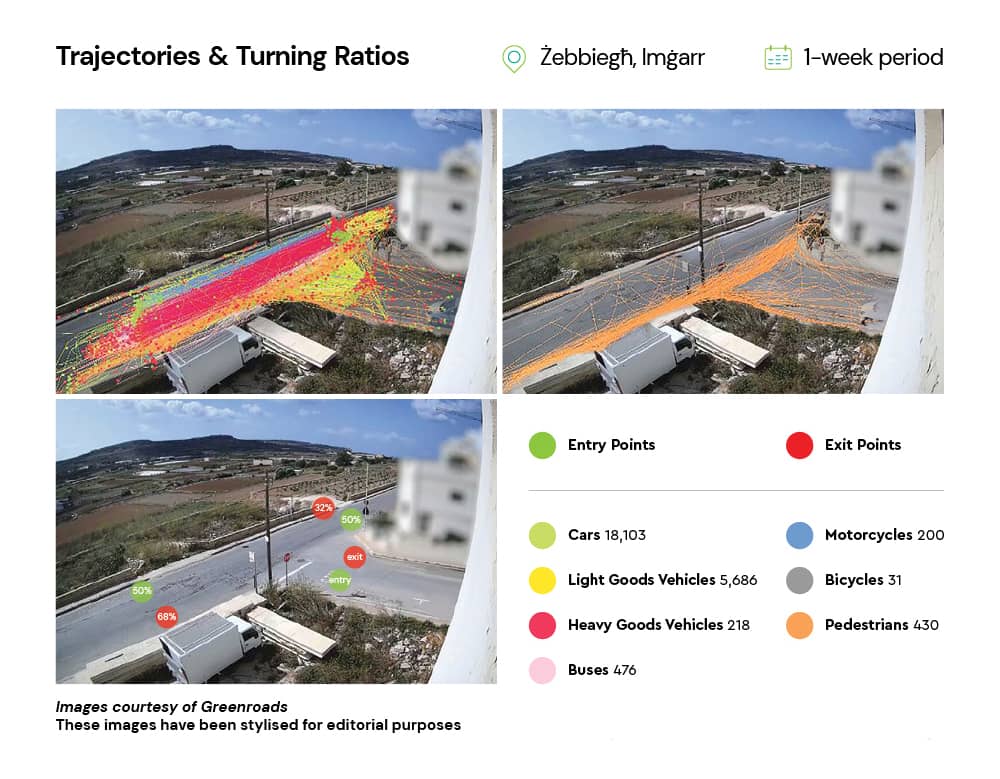Traffic! How does one even approach the problem of limited road space? For one start-up, the answer lies in the way we use roads and the data behind it. Zippy Tseng from THINK gets in touch with Claire Cianco from Greenroads to find out more!
When stuck in traffic, you can’t help thinking about improving the design of roads. The good news is that you are not the only one! Greenroads, located at the TAKEOFF Incubator at University of Malta, with the support of Infrastructure Malta, is working on a way to provide arithmetic data that can help improve Malta’s roads
Seeing the traffic problem in Malta, Claire Cianco, CEO of Greenroads, embarked on a mission to help curb the problem. She combines citizens’ experiences in Malta and the objectives of the EU Green Deal (issued in 2019, the deal states EU states are to become climate neutral by 2050) to create sustainable mobility solutions.
Greenroads to Sustainable Mobility
If we want to give the next generation a greener future, we need to become environmentally sustainable. Sustainable mobility, which highlights the reduction in emissions from transportation, is one of the policy areas under the EU Green Deal. To achieve this goal, research on smart traffic management systems is being conducted. Greenroads is one of the teams dedicated to developing these innovations.
By means of artificial intelligence (AI), Greenroads uses real-world data and delivers information on how different road users behave on existing infrastructure via a dashboard. This information empowers authorities and decision makers to introduce data-driven solutions for road planning. Greenroads captures and analyses traffic data, such as how many cars use a particular road and at what time. This data can then be used to manage public spaces, build roads, and plan smarter transportation systems.
Greenroads not only counts the number of cars passing by; the team has also developed an AI model that can classify the types of vehicles, whether they are buses, private cars, commercial vehicles, motorbikes, bicycles, or even pedestrians. This allows for a more comprehensive idea of who uses the roads and how people access the streets.

Success En Route
Like many other entrepreneurs, Cianco faced many challenges when she started Greenroads. The ideas changed from when she started the business to today; having dealt with a lot of uncertainty, she was determined to transform the business. Cianco described the beginning of Greenroads as a ‘good idea with no financial support.’ They submitted numerous projects to seek funding opportunities before Greenroads was awarded Climate-KIC funding and then the MARVEL project (Multimodal Extreme Scale Data Analytics for Smart Cities Environments), within a large consortium, in 2020. The aim of Greenroads matches with the MARVEL project’s objectives, which are ‘to help decision makers improve the quality of life and services available to citizens, particularly regarding open spaces and the road network.’
While funding is an essential element for a startup company, in Cianco’s mind, there is one thing more important than this: people. Seeking funding can be seen as building connections and relationships with others, as Cianco believes, ‘getting funding is not just about money, but about making others believe in your ideas and the projects you have been working on.’ It’s the same mentality when recruiting new talent; you need to find someone suitable for the position, and this person has to believe in the project you will be working on together in the future. For example, when starting off, Greenroads needed expertise in AI and machine learning. These are not Cianco’s areas of study, so she teamed up with Adrian Muscat and Johan Zammit, Kenneth Scerri for his expertise in the transport industry, and Louis Borg and Andre Xeureb for innovation. ‘If you want your startup business to grow, you have to find people better than you and not be afraid of other people being better than you,’ said Cianco when she talked about how the Greenroads’ team formed.
Speaking of building teams, Cianco highlighted the importance of having access to talent pools for a business. Being based at TAKEOFF within the University of Malta gave Greenroads the advantage of working with the Knowledge Transfer Office and tapping into researchers in the area, who help develop new projects.
Embark on the Startup Journey
‘A start-up is not a part-time gig,’ Cianco said when she thought back on the journey she has been through. She suggested that aspiring entrepreneurs should invest in their lives first and have a comprehensive financial plan before jumping into the startup industry. After all, it will be hard for people to chase their dreams without having a roof above their heads. Planning ahead is important, but life is unpredictable, and things can change in just one second, especially in the startup world. ‘Young entrepreneurs should be able to accept changes, be ready to adapt to different situations, and move forwards,’ Cianco points out.
The most challenging thing about a start-up is to actually start it. For Cianco, there are three crucial steps: ‘Think about it. Talk about it. Start developing it.’ To think about it, you draw a big picture of the ideas you have in mind. To talk about it, you absorb suggestions and advice from others and adjust your ideas. Finally, to start developing it, you begin with achievable things, work hard, and wait for the right timing and finances to come. Cianco said, ‘the success of a startup business requires a lot of dreams and ideas, but you have to work persistently enough to make that dream come true.’
Greenroads has already accumulated experience through working on projects with partners in Malta. In the future, the team’s vision is to go international. They wish to spread their services and solutions for sustainable mobility worldwide. Perhaps Greenroads can blaze a trail towards a greener future.





Comments are closed for this article!